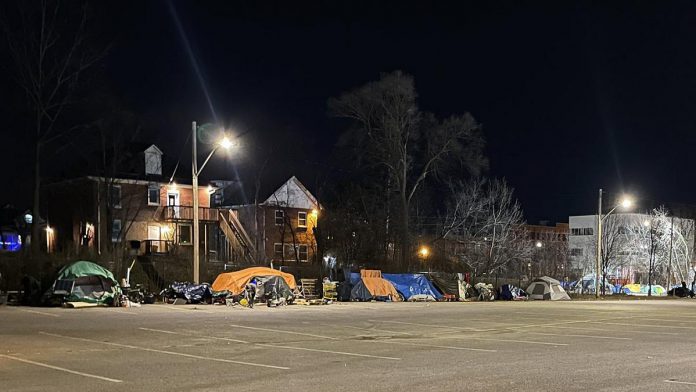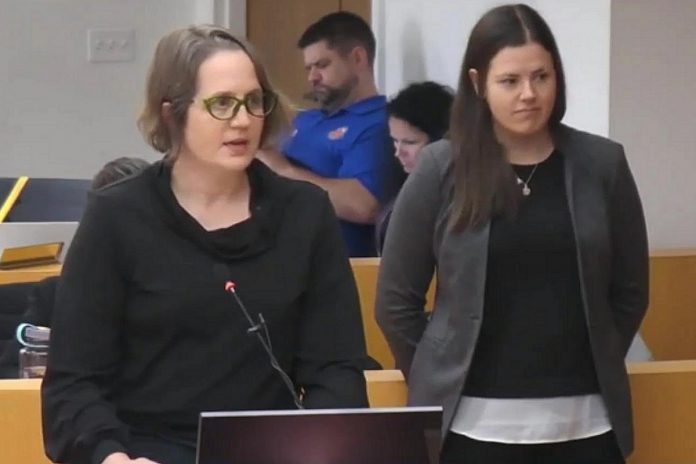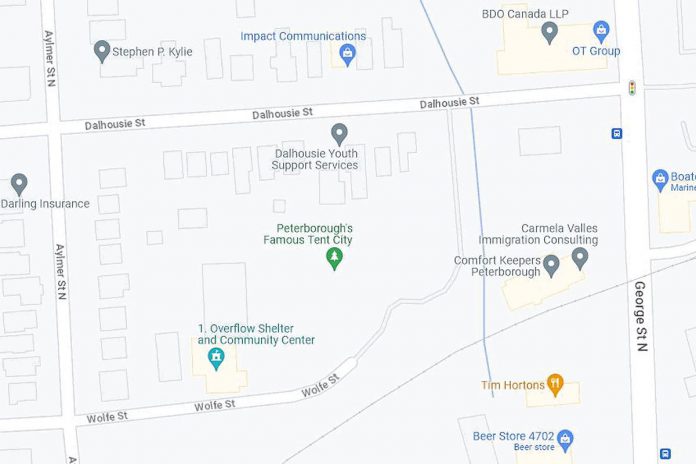
A majority of Peterborough city council, meeting as general committee on Monday night (May 8), endorsed a staff recommendation that the city use new provincial homelessness funding to enhance the city’s Wolfe Street overflow shelter by this fall with temporary modular housing units and support services for unhoused people tenting near the shelter.
It was the key recommendation of a comprehensive homelessness strategy plan report (see below for details) presented to council by the city’s new social services director Rebecca Morgan Quin and homelessness programming manager Jocelyn Blazey.
“I do want to emphasize from the outset that what we’re talking about is a high-level concept,” Morgan Quin said. “If we have council’s approval to move forward with the concept, we have a lot of details to work out. But we have spoken to community partners in a general way about what this could look like, and we will get started working as soon as we have that approval.”
Following Morgan Quin and Blazey’s presentation of the plan, councillors posted a series of questions to the presenters and to the city’s community services commissioner Sheldon Laidman. Questions included how the city will engage with homeowners and business owners in the neighbourhood, whether drug and alcohol use would be allowed in the modular housing units, whether tents would still be allowed after the modular housing units are installed, who would operate the enhanced shelter, and whether the enhanced shelter would be permanent.
Mayor Jeff Leal, a former provincial cabinet minister, lauded the work of city staff and councillors Keith Riel and Alex Bierk (chair and vice chair of the city’s homeless portfolio) by describing the report as a “cabinet-quality report.” Leal also proposed an additional recommendation for the report to create a neighbourhood liaison committee of five to seven people. including one councillor and one police officer.
“We’re resourcing the area in a way that’s going to meet the needs of not only the people that are unhoused, but it’s going to meet the needs of the neighbourhood,” councillor Bierk said. “We’re offering structure there that currently doesn’t exist. This is an emergency response. Mark my words, this will be better than what we have now, and this is definitely better than us not doing this tonight and continuing to have the situation at Wolfe Street get out of hand.”

Bierk asked Morgan Quin to describe some of the benefits of the enhanced Wolfe Street shelter for the neighbourhood.
“One of the pieces in the plan that we haven’t really touched on but is definitely something we hear from neighbours is lack of facilities for people,” Morgan Quin said. “If people are concerned with (unsheltered people) using someone’s front yard as their washroom, then providing washrooms could be a major step up. If people are concerned with shopping carts going missing and (unsheltered people) wandering all over the city and they don’t want to see that, if people have a place that they can be and they can store their things, they don’t have to carry it with them everywhere — they’re not carrying it with them because they want to, they’re carrying it with them because they’re afraid that someone will steal it while they are away. It will improve the feeling in that neighbourhood. It will also alleviate some of the concerns that people have downtown.”
Following the questions to the presenters, councillors debated the homelessness strategy plan report.
“The era of tenting is over,” Mayor Leal said. “We just can’t allow it. If we’re making this kind of investment, the elimination of tents is an absolute must.”
“This is not a plan written on the back of a napkin,” councillor Bierk said. “This is a plan with a lot of variables, but we’re going to put faith (in) the experts in our community to work with the city and to work with us to make sure that all those unknowns and all those variables are done with evidence-based approaches that are going to work for people that are unhoused and people in the community.”
Councillor Dave Haacke requested the report’s key recommendation to use provincial funding to enhance the Wolfe Street shelter — the backbone of the plan to address the immediate homelessness crisis — be separated out so councillors could vote on it independently from the rest of the report, saying he supported the report other than the key recommendation.
“If this doesn’t pass tonight, we’re back at square one,” councillor Bierk said. “We can recommend everything but (the key recommendation), but we still don’t have a plan. We still have to deal with the current reality — which, yes, you’re right councillor Haacke, we can all agree upon, that the current reality is not working. So what happens if we don’t accept this plan? We still have no plan and things continue to get worse. I support this. I have faith it’s going to work. I have faith that over time the neighbourhood will come to see that it’s going to address the needs of the community while we work towards those mid-term and long-term goals.”
VIDEO: Peterborough city councillor Alex Bierk – May 8, 2023
After voting unanimously to endorse the report without the key recommendation, councillors voted 7-4 vote to also endorse the key recommendation.
Mayor Jeff Leal and councillors Joy Lachica, Alex Bierk, Keith Riel, Matt Crowley, and Kevin Duguay voted to endorse the recommendation and councillors Dave Haacke, Andrew Beamer, Don Vassiliadis, and Lesley Parnell voted against it.
The general committee endorsement will go forward to the regular city council meeting on Tuesday, May 23rd to be considered for approval. Registered delegations will be able to appear before council at that meeting to support or oppose the endorsement.
Homelessness Service Strategy and Update
The city’s May 8th “Homelessness Service Strategy and Update” makes a number of recommendations to address the city’s homelessness crisis, most notably that the city create temporary modular housing units near the overflow shelter at 210 Wolfe Street and that the city fund an emergency winter response program, both by the fall of this year.
The modular housing units could be single cabins, multi-room units, dorm-style units, or connectable units. The enhancements at Wolfe Street would also include access to bathroom and shower units, storage for belongings, access to support services, and security supports.
The report recommends reallocating over $3.4 million to fund the Wolfe Street enhancements and the emergency winter response program. The funding includes an almost $2.5 million increase over the next three years provided to the city in 2023 from the Ontario government’s Homelessness Prevention Program (for a total allocation of almost $7.7 million), $667,000 in funding for the Wolfe Street overflow shelter, and $267,000 for a daily meal and drop-in centre space through the One Roof Community Centre at St. John’s Anglican Church, which has informed the city is will no longer provide the service as of the end of December.

The city currently funds 74 shelter beds available 24/7 — 32 beds at Brock Mission, 12 beds at Cameron House, and 30 beds at YES Shelter for Youth & Families — as well as the 32-bed overnight shelter at Wolfe Street.
According to the report, over the first three months of 2023, the average occupancy of these beds was 86 per cent, ranging from 79 per cent occupancy at YES Shelter for Youth & Families to 100 per cent occupancy at Brock Mission. As of April, there were 302 people on the city’s by-name priority list of people either staying in shelters, living outside, or in precarious housing situations, with more than half of them experiencing chronic homelessness. There were 53 people in the city identified as sleeping outside in April.
“There is a significant number of individuals who are unsheltered near the Wolfe Street Overflow Shelter,” the report states. “This is causing stress in the neighbourhood while it is unsafe, unsuitable, and unhealthy for those tenting.”
The report recognizes that, regardless of the availability of beds, some unsheltered people choose not to use the shelter system. The most common reasons unsheltered people give for not using the shelter system are because of concerns about their own personal safety or that of their personal belongings, because their friends or family members are living outside, or because of the lack of autonomy (the ability to come and go when needed) in the shelter system.
“By providing modular units, clients who are currently unsheltered would be safer and be supported towards stabilization, and ultimately permanent housing,” the report states. “The usage of temporary modular building units not only provides a more secure, safe, and healthier form of temporary housing for those currently unsheltered but also provides a better model for paying for shelter services.”
City staff are recommending the modular units be located at 210 Wolfe Street and the Rehill parking lot because it is city-owned property that is large enough to accommodate the number of units required and the Wolfe Street building has already been retrofitted to provide bathrooms, showers, and meals. As the Wolfe Street building also has office space, it has the potential to serve as a community hub for unsheltered people to get services from community agencies.
As part of the plan, fencing would be installed to enhance privacy for people using the temporary housing and for neighbours in the Wolfe Street area.
“There are concerns that any locations outside of the downtown core will not be utilized by individuals who need or prefer to be able to easily access services downtown,” the report states. “Providing locations only outside of downtown will ensure that persons will continue to attempt to tent in downtown area parks.”
“While the specifics of this plan still need to be determined, staff are seeking council support for the concept and location, and the delegation of decision-making abilities to ensure all elements required can be implemented by the fall of 2023,” the report states. “Staff are not proposing a specific timeframe that the Wolfe Street enhancements would remain in place to allow time to invest in permanent solutions and plan for next steps.”
“The goal is that clients will be supported to move into existing supportive housing programs and or resolve their experience of homelessness but, in the meantime, will be provided a unit that is more secure, safer, healthier, and more able to meet individual needs. This plan will meet both the needs of the current clients who are unsheltered, while also supporting the neighbourhood that is currently at Wolfe Street. It is expected that reorienting supports from the Overflow Shelter to these modular units along with better security, site improvements, and on-site storage may lessen the impact on the neighbourhood.”
According to the report, while city staff “do not believe that one site on the periphery of the city or away from the downtown can meet the needs and preferences of those currently unsheltered and tenting,” they are recommending “additional locations be pursued to provide temporary modular units on private lands elsewhere in the city with appropriate supports.”
“This would serve to alleviate the usage of Wolfe Street and can provide alternative options for those unsheltered. Staff are recommending that additional locations be pursued to provide temporary modular units on private lands elsewhere in the city with appropriate supports.”
In April, Habitat for Humanity Peterborough and Kawartha Region announced it had partnered with Peterborough Action for Tiny Homes (PATH) to lease the former Peterborough Humane Society building at 385 Lansdowne Street East to PATH for three years to provide transitional shelter support by hosting 15 sleeping cabins with access to shower and bathroom facilities in the main building. In December, city council voted against a temporary use by-law and potential site plan exemption application to allow PATH to use a property at 834 Park Street for this purpose.
The report proposes that the Wolfe Street building could also be used as the proposed winter emergency response program location.
“As demonstrated last year, there is a need for a winter drop-in program in addition to the shelters,” the report states, referring to the Stop Gap Drop-In Space operated by community agencies from January to April this year, after city council voted in December not to provide $100,000 in funding for the Stop Gap Drop-In Space.
“There was a significant number of clients who utilized that space and where it was often at capacity. It is clear that there needs to be a specific overnight drop-in space during the winter to keep individuals in the community out of the elements and support them to stay alive.”
To provide a 24/7 emergency winter response program, the report states, it is likely the $267,000 in funding previously allocated to One Roof would need to be augmented by the increased Homelessness Prevention Program funding from the province.
PDF: Homelessness Service Strategy and Update, Report CSSS23-013
Homelessness Service Strategy and Update, Report CSSS23-013


























